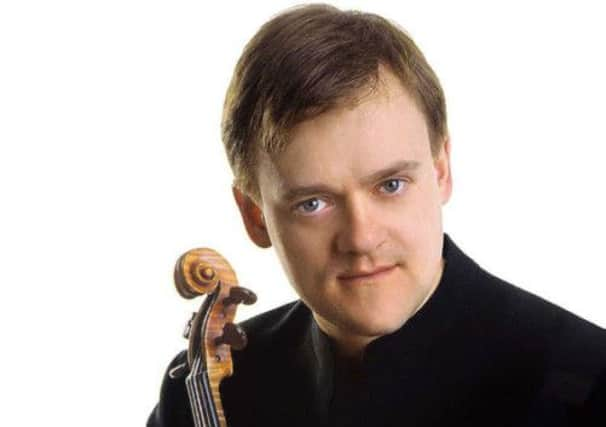Frank Peter Zimmermann on his return to Brahms


That was a week ago, and Zimmermann was talking about a concerto he loves revisiting from time to time – he has played it about 100 times in his career – but prefers to do so in relatively small doses. It’s three years since he last played the Brahms, but feels the time is right to bring it back.
That’s wonderful news for Edinburgh Festival audiences, as tonight sees Zimmermann – a soloist admired for his precision touch, rich-grained interpretations, wide-ranging repertoire, and who enjoys equal status as a chamber musician with his own Trio Zimmermann – performing it with the Tonhalle Orchestra Zürich in the first of its two Edinburgh programmes under music director David Zinman.
Advertisement
Hide AdSo what is it about Brahms’ epic concerto that leaves Zimmermann feeling he’s eaten several Stollen too many? Was conductor Hans von Bülow right when he claimed it was a concerto written “against the violin” rather than “for the violin”? Put more positively, was Brahms more interested in writing something specifically symphonic, rather than opting for the typically flamboyant Romantic show piece?
“The orchestral writing is so rich, so hard to compete with,” Zimmermann argues. “It’s a real contest between the soloist and orchestra. But in a way, that’s what makes it such a great symphonic piece. Brahms was one of the first to write the solo violin properly into the development section [the moment in symphonic music where the composer tests the potential of his main themes by dissecting them and venturing into distant keys] where other composers would have settled for simple lyrical mode, or relied on the cadenza.”
However, he says, there is an issue with Brahms, a non-violinist, not quite writing in a groove that ideally suited the instrument. But why should that be, when Brahms enlisted the technical help of legendary violinist Joseph Joachim, the virtuoso who eventually premiered it in 1879 in a programme that, amazingly, also included Beethoven’s Violin Concerto?
“Probably half the solo part was influenced, possibly even written, by Joachim,” says Zimmermann. “But the piece is not as violinistically perfect as the Mendelssohn or Beethoven concertos. Maybe that’s what contributed to its initial lack of success. Not until the 1920s or 1930s did it get properly established in the repertoire.”
“I don’t want to sound arrogant, as it is a great piece, but compared to the Beethoven it’s not of the highest level. And in Brahms’ own case, it’s not up there with his 2nd Piano Concerto, which is perfect, or some of his chamber music, which is to die for.”
Yet that hasn’t stopped Zimmermann picking up the challenge once again. “I went back to it ten days ago, and already I’ve found new ideas. A lot of that is to do with producing the right quality of sound.”
Advertisement
Hide AdThat’s unlikely to be a problem for Zimmermann when, for the past 12 years, he has been playing the “Lady Inchiquin” Stradivarius once owned by Fritz Kreisler. “I’ve been playing on Strads since I was 20,” says the 48-year-old, who gave his first public concert when he was ten.
What’s more, he nearly managed to acquire the one once owned by his greatest violin hero, Nathan Milstein. “In 1989, the London dealer Charles Beare approached me to say that Milstein was selling his Strad and would I like to try it out. I did, played the Brahms on it, but had to give it back as the family then decided not to sell it.
Advertisement
Hide Ad“That was a huge disappointment,” he says. “It tore my heart.”
Luckily, Zimmermann eventually found what he was looking for in the “Inchiquin” Strad.
“It had belonged to a member of the Berlin Phil who had bought it in the 1970s,” he explains. More significantly, though, it once belonged to Kreisler who, as a young man, knew Brahms personally, and even later owned the manuscript of his Violin Concerto.
With direct connections like that tucked under Zimmermann’s chin, overdosing on Brahms can’t be all that bad.